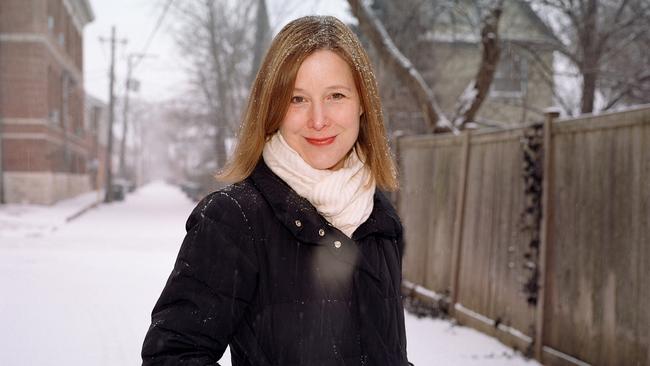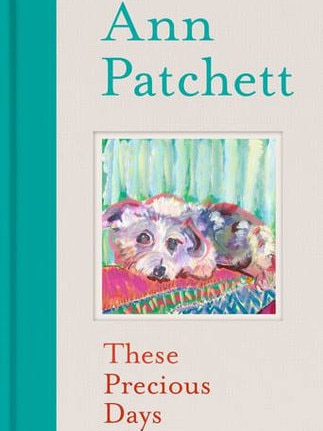Ann Patchett’s precious stories on path through life
Bestselling author Ann Patchett’s work and life have been shaped by her Catholic education - and divorce.

Ann Patchett worries that she will die while writing a novel. That she might step off a kerb at the wrong moment, fall off a hiking trail, get eaten by a mountain lion, drown in the ocean. Normally indefatigably buoyant, her morbidity is due to the fact that if she abruptly exits, she will take an entire invented world with her: the people, “as well as the towns they lived in, their houses and cars, all the trees and the colour of the light”. That thought is unbearable.
“Those people,” she says indignantly, “are my responsibility, I want them to have their chance.”
When the book is finished the fear of death disappears “without a word”, only to return a few chapters into the next novel: “Every trip outside is a meditation on mortality.”
It is fortunate, then, that we are here to talk about her book of essays, These Precious Days. Essays hold no such fears. She can board a plane in peace. Essays are based on fact and facts will still be facts even without a writer to massage them. They can’t be as easily lost as an agonisingly conceived imaginative world. Essays are just easier, “and in that sense I think I am more suspicious of them”.
With these essays and 2013’s The Story of A Happy Marriage, we follow what seems a relentlessly cheerful, if reflective, path through life. An acute observer, everything is a story, often wry. In her deceptively subtle style we know as much about her as she wants us to while inviting us on an intimate journey. If, in the unlikely event she secretly has a dark and bitter side, you certainly won’t be reading about it.

At 58, Patchett is a literary Grand Dame, a four-times New York Times best-selling novelist. We learn that she is a good daughter, a loving wife, a nurturing friend and after 12 years of Catholic education, a doer of good deeds.
The frame of the book is her friendship with Sooki Raphael, an artist and longtime assistant to Tom Hanks. It is Sooki, a vivid personality, whose long slow death from cancer will inadvertently give the book its title; every day is indeed precious.
Patchett tells the story of Father Dan Richardson, who found joy in serving the most downtrodden. “The kind of Catholicism that I grew up with and was so shaping in my life was that sense of serving people. There’s just a sort of do unto others as you would have them do unto you bedrock that I grew up with. If you find joy and energy in that you’re going to have a really good life.”
Her late father, a Los Angeles cop, was her first reader and critic, who drew a big X through swearing and sex in her books, that she ignored.
In a ruthless declutter of her house she found etched crystal champagne flutes and Waterford brandy snifters she had been collecting since high school. “Who did I think I was going to be next,” she writes. “Scott Fitzgerald? Jay Gatsby? Would I drink champagne while standing in a fountain? Would I throw a brandy snifter into the fireplace at the end of an affair?”
She always knew she would be a writer, now she says, “it was like I was going to grow up in an Edith Wharton novel”.
On a Zoom call from her Nashville home she seems exactly as she is on the page. Curled up on a brocade sofa in a large light-filled room, a round antique table in the background, hair pulled back, tortoiseshell glasses, fresh-faced, she is lively, amusing, vivacious, giving no sense of the fact that a new book from her is such a huge event that she is probably on her 10th interview of the day. She’s not on social media and doesn’t have a cell phone. “The only thing that kills me is email.” A veteran of promotional book tours since her first novel was published at the age of 27, Patchett is wary of the reverence writers in America can be afforded. “I’m writing books, so what? I did not come up with the Covid vaccine, I’m not solving the climate crisis, I’m writing books.”
Her adored small dog Sparky will be hauled onto her lap and look poignantly into the camera for the duration of the interview. She has been asked over and over again about not having children. In This is the Story of a Happy Marriage she wrote: “All I ever wanted was a dog. Other girls grew up dreaming of homes and children, true love and financial security; I envisioned shepherds and terriers.”
Twice married, Patchett is a child of divorce. Her mother married three times. “When you have a lot of parents you don’t need any one of them to come through for you all the way. In our family all roads lead back to divorce and the sort of central mistakes of our early marriages.”
She realised that it was a repeating theme in her work in books like Bel Canto, State of Wonder, The Patron Saint of Liars. “It was about a group of strangers thrown together who formed a family. Well obviously this has to do with my own family.”
She decided to tackle it head on with the greatly admired Commonwealth, based on her own family, which was split into two families by divorce and remarriage. It is hard to beat the opening sentence: “The christening party took a turn when Albert Cousins arrived with gin.” That would be the moment that broke apart everything in a 60s suburban family.. “And I really think it worked,” says Patchett of exorcising that theme. Her next book, The Dutch House, “was a very different kind of book”.
There is a lot of thinking about a book before she commits to it, long periods not writing. Or writing the less arduous essays instead while the novel percolates in the background. “There are times I feel like it’s a hairball at the back of my throat, if I cough really hard I could bring the whole thing straight up.
“ ... I am a very poor starter. I can rewrite the first 30 pages forever, it’s like digging a basement for a house. I change every word, every sentence, jiggle things around, trying to get the sound right. It’s like squinting, like if you are in a snowstorm or there’s a lot of fog and you can see something but can’t quite figure out what it is. What does she sound like? What kind of soap does she use? What are her sheets like? Is this really what the house looks like? ... There are all of these things that you don’t know. And then suddenly you see it.”
At that stage she can only stay in her chair for about 20 minutes. “Once I get the stage and the people set then I’m pretty good.” She will “dutifully slog” through the middle, “a good soldier”, but at the end “I can spend 12 hours in my chair”.
Because she was rushing at the beginning of The Dutch House, the story of a brother, sister and a house in Philadelphia over five decades, the book was “just awful. I didn’t spend enough time thinking and putting it all together. The road forked early on and I went right instead of left and the whole book was wrecked. I just made so many bad choices.” She threw it out and started again, successfully this time.
There are stories everywhere Patchett says, “if you just keep your eyes open”.
“Sometimes I think I write these essays as a way to put things down, to not carry them with me forever. There’s a real comfort in that.”
These Precious Days by Ann Patchett, Bloomsbury, $39.99, is out on February 1



To join the conversation, please log in. Don't have an account? Register
Join the conversation, you are commenting as Logout